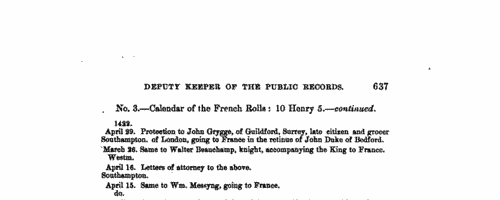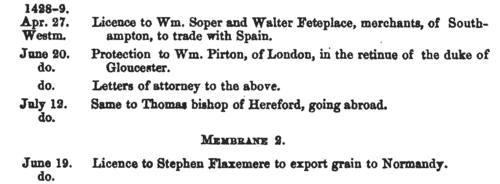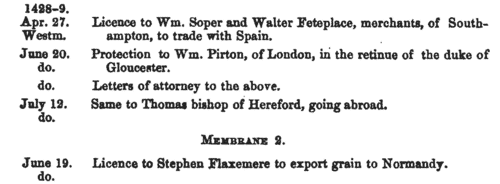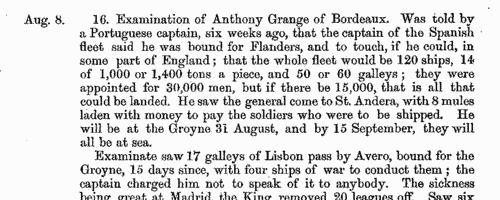Chateau Surname Ancestry ResultsOur indexes 1000-1999 include entries for the spelling 'chateau'. In the period you have requested, we have the following 7 records (displaying 1 to 7): Buy all | | | Get all 7 records to view, to save and print for £42.00 |
These sample scans are from the original record. You will get scans of the full pages or articles where the surname you searched for has been found. Your web browser may prevent the sample windows from opening; in this case please change your browser settings to allow pop-up windows from this site. The English in France
(1422)
King Henry V of England claimed the throne of France (and quartered the fleurs-de-lis of France with the lions of England on the royal standard) as had his predecessors since Edward III, as descendants of Philip IV of France. He married Katherine, youngest daughter of king Charles VI of France in 1420, and thereafter styled himself 'heir and regent of France'. The English had real power or influence in Brittany, Normandy, Flanders and Gascony, and actual possession of several coastal garrisons, in particular Calais, where the French inhabitants had been replaced by English. The English administration kept a series of records called the French Rolls. On these are recorded royal appointments and commissions in France; letters of protection and safe-conduct to soldiers, merchants, diplomats and pilgrims travelling to France from England and returning, and to foreign legations. There are also licences to merchants to export to the Continent, and to captains to transport pilgrims. This calendar of the French Roll for the 10th year of the reign of Henry V (from 21 March to his death 31 August 1422) was prepared by Alexander Charles Ewald and published in 1883. CHATEAU. Cost: £6.00.  | Sample scan, click to enlarge

| The English in France
(1430)
King Henry VI of England (one of the grandsons of Charles VI of France) claimed the throne of France (and quartered the fleurs-de-lis of France with the lions of England on the royal standard) as had his predecessors since Edward III, as descendants of Philip IV of France. The English had real power or influence in Brittany, Normandy, Flanders and Gascony, and actual possession of several coastal garrisons, in particular Calais, where the French inhabitants had been replaced by English. Henry VI came to the throne only seven years after his father had trounced the French at Agincourt; but his cousin, Charles VII, who became king of France in the same year, spent his long reign rebutting the English king's claim to his throne by territorial reconquest and consolidation. The English administration kept a series of records called the French Rolls. On these are recorded royal appointments and commissions in France; letters of protection and safe-conduct to soldiers, merchants, diplomats and pilgrims travelling to France from England and returning, and to foreign legations. There are also licences to merchants to export to the Continent, and to captains to transport pilgrims. As Henry VI's reign progressed, and the English grip on northern France loosened, the French Rolls also increasingly include entries concerning the ransoming of English prisoners.CHATEAU. Cost: £6.00.  | Sample scan, click to enlarge

| The English in France
(1434)
King Henry VI of England (one of the grandsons of Charles VI of France) claimed the throne of France (and quartered the fleurs-de-lis of France with the lions of England on the royal standard) as had his predecessors since Edward III, as descendants of Philip IV of France. The English had real power or influence in Brittany, Normandy, Flanders and Gascony, and actual possession of several coastal garrisons, in particular Calais, where the French inhabitants had been replaced by English. Henry VI came to the throne only seven years after his father had trounced the French at Agincourt; but his cousin, Charles VII, who became king of France in the same year, spent his long reign rebutting the English king's claim to his throne by territorial reconquest and consolidation. The English administration kept a series of records called the French Rolls. On these are recorded royal appointments and commissions in France; letters of protection and safe-conduct to soldiers, merchants, diplomats and pilgrims travelling to France from England and returning, and to foreign legations. There are also licences to merchants to export to the Continent, and to captains to transport pilgrims. As Henry VI's reign progressed, and the English grip on northern France loosened, the French Rolls also increasingly include entries concerning the ransoming of English prisoners.CHATEAU. Cost: £6.00.  | Sample scan, click to enlarge

| Official Papers
(1598-1601)
The State Papers Domestic cover all manner of business relating to Britain, Ireland and the colonies, conducted in the office of the Secretary of State as well as other miscellaneous records.
CHATEAU. Cost: £4.00.  | Sample scan, click to enlarge

| Merchant Seamen (1835-1844)
At this period, the foreign trade of ships plying to and from the British isles involved about 150,000 men on 15,000 ships; and the coasting trade about a quarter as many more. A large proportion of the seamen on these ships were British subjects, and so liable to be pressed for service in the Royal Navy; but there was no general register by which to identify them, so in 1835 parliament passed a Merchant Seamen's Registration Bill. Under this act a large register of British seamen was compiled, based on ships' crew lists gathered in British and Irish ports, and passed up to the registry in London. A parliamentary committee decided that the system devised did not answer the original problem, and the register was abandoned after less than two years: the system was then restarted in this form, with a systematic attempt to attribute the seamen's (ticket) numbers, and to record successive voyages. The register records the number assigned to each man; his name; age; birthplace; quality (S = seaman, &c.); and the name and official number of his ship, with the date of the crew list (usually at the end of a voyage). Most of the men recorded were born in the British Isles, but not all. The system was still very cumbersome, because the names were amassed merely under the first two letters of surname; an attempt was made to separate out namesakes by giving the first instance of a name (a), the second (b), and so on. In this volume the register is restarted from 1840 onwards, with the mariner's previous number (if any) being entered in the column after his birthplace. In the event of it becoming known that a man had died during the course of a voyage, that information is written across the remaining empty columns. This volume (BT 112/12) covers mariners whose surnames start with Ce (and McCe), Ch (and McCh) and a handful with Ci.
CHATEAU. Cost: £8.00.  | Sample scan, click to enlarge

| Patentees of New Inventions
(1859)
Abstracts of British patents for new inventions applied for and granted from 1 January to 31 December 1859: giving date, name and address, and short description of the invention. It is then stated whether 'Letters patent sealed' or 'Provisional protection only'.CHATEAU. Cost: £6.00.  | Sample scan, click to enlarge

| Unclaimed Shares of Special Gratuities for Naval Service in Egypt and the Soudan
(1882-1885)
Various gratuities were awarded to officers and men who served on board her Majesty's ships during the wars in Egypt and Soudan. The Achilles, Agincourt, Alexandria, Beacon, Bittern, Carysfort, Chester, Cockatrice, Condor, Coquette, Cygnet, Decoy, Dee, Don, Dragon, Eclipse, Euphrates, Euryalus, Falcon, Hecla, Helicon, Humber, Inconstant, Inflexible, Invincible, Iris, Malabar, Minotaur, Monarch, Mosquito, Northumberland, Orion, Orontes, Penelope, Ready, Ruby, Salamis, Seagull, Seahorse, Sultan, Superb, Supply, Tamar, Temeraire, Thalia, Tourmaline and Wye were engaged in the Egypt Operations of 1882; the Arab, Briton, Carysfort, Decoy, Dryad, Euryalus, Hecla, Humber, Jumna, Orontes, Ranger, Serapis and Sphinx in the Soudan Operations of 1884; and the Albacore, Briton, Carysfort, Condor, Coquette, Cygnet, Dolphin, Falcon, Helicon, Humber, Iris, Myrmidon, Rambler, Ranger, Sphinx, Starling, Turquoise, Tyne and Woodlark in the Soudan and Nile Operations of 1884 to 1885. Some of these gratuities remained undistributed by 1902, when this comprehensive list of the unclaimed moneys was printed. In each case the sailor's name is given first (surname, then christian name or initials); rank or rating; ship in which serving at time of capture or award; and amount of award (usually £2 or £5).CHATEAU. Cost: £6.00.  | Sample scan, click to enlarge

|
Research your ancestry, family history, genealogy and one-name study by direct access to original records and archives indexed by surname.
|









